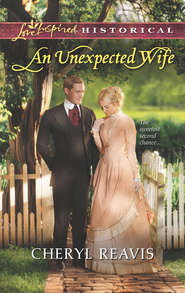По всем вопросам обращайтесь на: info@litportal.ru
(©) 2003-2024.
✖
The Bride Fair
Настройки чтения
Размер шрифта
Высота строк
Поля
Touché, he thought, and he very nearly smiled.
“Do you usually run errands for the military?” he asked to keep her off balance, and she stiffened slightly.
“My father was asked—ordered—by Major Hunt to retrieve you from the station and take you wherever you want to go. But he isn’t well enough to do so. I came in his stead. I obey my father’s wishes.”
“I see,” he said again. And he was beginning to. She was going to be a dutiful daughter—if it killed her.
“I’ve brought you a horse,” she said, indicating a nearby animal with a military saddle and brand. “I will show you the way either to the house or to your headquarters—or to the fire,” she added as an afterthought. “As you wish.”
She walked on and stepped into a nearby buggy without assistance, then waited for him to untie the horse at the hitching post and mount.
“I am much in your debt, Miss…?”
“Don’t be,” she said. “It was none of it done freely.”
The remark was more matter-of-fact than hostile. He stared at her, impressed by her temerity in spite of himself.
“I prefer the buggy,” he said, for no other reason than to inconvenience her. Her remark warranted at least that—inconvenience.
He had already made arrangements for his belongings to be sent to military headquarters, and he climbed into the buggy beside her without waiting for her permission, sitting down on a goodly portion of her black skirts before she could get them out of the way. She sat there for a moment, struggling not to let him see how much his presence disturbed her. Then, she snapped the reins sharply and sent the horse on.
“No,” he said, when she would have turned the buggy toward the center of town. “That way.”
He pointed in the direction he wanted to go, toward the railroad cut and the outskirts of town. “I insist,” he added in case she believed their destination to be a matter for discussion.
She continued in the direction he indicated, her back ramrod-straight. He could just smell the rosewater scent of her clothes and hair. There were only a few people on the street. All of them turned and stared curiously as they rode past.
“I fear I may have compromised your reputation,” he said.
She made no reply, reining the horse in sharply when it elected to trot.
“Sir, there is nothing out this way,” she said, still struggling with the reins. “If you—”
“I know what is out here,” he interrupted. “And I want to see it.”
It was the third time in his life he had taken this route. The first time had been in the early summer of 1864. He had disembarked from the train—much as he had today—except that then he had arrived in a boxcar with fifty other men and under an armed guard.
He had made a return trip to the depot in late February of 1865. That excursion he didn’t remember at all. He’d been too ill to walk, and several kind souls, who were probably not much better off than he, had carried him. His good friend, John Howe, wasn’t among them, of course. He and John had been captured and sent to the Confederate prison here at the same time, but John had made his escape a month earlier—and with a Rebel girl in tow. John Howe had never been one to do things by halves when it came to women.
The horse finally settled down, and Max indicated where exactly he wanted the woman to take him. When she hesitated, he took the reins from her hands and effected the maneuver himself. She made no protest, regardless of how badly she wanted to, and she kept glancing at him as they rode along.
He had no difficulty locating the entrance to the prison—or what was left of it. He drove the buggy directly over the railroad bridge and into the weeds that now covered the grounds. The stockade walls had disappeared, but there was still more of the place left standing than he had expected. Until now, he had liked to think that General Stoneman, who had been a prisoner of war himself, would have celebrated his raid of the town by leveling the prison entirely and sowing the ground with salt.
But the outer walls of the huge three-story factory building used to confine as many prisoners as was inhumanly possible remained. He got some small satisfaction from seeing that the roof and windows were gone and that the hospital and the cookhouses were mostly rubble. Part of a wall stood here, a chimney there—and all of the giant oak trees inside the compound had been cut down. Only the stumps remained. He couldn’t tell where the stone wells had been, but he could still see the huge burrows in the red clay earth where men had been forced to live and where so many had died. It was only by the grace of God that he had not been one of them.
He abruptly handed the woman the reins and got out of the buggy, standing for a moment to get his bearings. Then he began to walk. The weeds were taking over, but he could still see the scattered evidence of the men who had been held here. Broken glass, the bowl of a clay pipe, a belt buckle, a brass button. He could smell the jimpson weed, but it was an altogether different stench he kept remembering.
He turned and forced himself to walk in the direction of what had once been a cornfield and a dead house, but that, too, was gone. He walked up and down, looking for the burial trenches. He wanted—needed—to stand there again—to be reminded why he’d stayed in the army after Lee’s surrender, in spite of his precarious health and his family’s protests.
It began to rain. A few random drops at first, and then a sudden downpour. He couldn’t see any landmarks. Nothing.
He kept walking back and forth in the area he thought the trenches would be, but there were no markers and no sunken earth.
Where are they?
He had friends buried here—good men who deserved better, men who would have never made their own escape and left him behind to die. He could see their faces again, hear their entreaties.
Please, Sir. You tell my mama how to find where I am—
But he couldn’t tell anyone’s mother where her son had been buried. The lay of the land was different somehow, overgrown and unrecognizable. There was nothing to guide him anymore, not even the foundation of the house where the bodies had been kept until somebody found time for another mass burial.
Where are they!
He felt unsteady on his feet suddenly. He could feel his heart begin a heavy pounding in his chest. It was hard to breathe, and he had to fight down an incredible urge to run. He took a deep breath and abruptly clasped his hands behind his back to keep them from shaking.
It would pass. He knew that. All he had to do was wait.
He glanced back at the woman. She sat in the buggy where he’d left her, pale and on the verge of becoming alarmed. He turned and walked unsteadily in her direction. He wasn’t about to fall on his face and give her any tales to tell about the new colonel.
This time she got her skirts out of the way when he climbed into the buggy. He sat beside her, still fighting down the memories of his captivity.
The rain drummed loudly on the buggy top.
“Do you want to go to military headquarters?” the woman asked after a time.
He looked at her sharply. He’d forgotten all about her.
“Yes,” he said finally.
She snapped the reins and sent the horse forward, turning the buggy in a wide circle and heading back in the direction they had come. He paid no attention to the route she took nor the surroundings until she abruptly stopped.
“It’s there—the upstairs,” she said, indicating a two-story building across from a hotel. Much of the street out front had been taken over by harried-looking civilians—old men, women and children, all of them clearly unmindful of the weather.
“Who are all these people?” he asked, and she kept avoiding his eyes.
“They are…they’ve come because they’re afraid,” she said.
“Of what?”
She didn’t answer him; she merely shook her head, as if it were too complicated for her to explain—or for him to understand.
He stared at her a long moment. “I expect I shall find out soon enough.”
She seemed about to say something, but didn’t. He gave her a curt nod and got down from the buggy, then began walking toward the building that housed the North Carolina Western Division military headquarters. He had to literally push his way inside. Women plucked at his sleeve as he tried to pass, some in supplication and others with an obviously more commercial intent. He ignored all of them to put the fear of God into the first soldier he saw—a hapless private who lolled against a wall happily conversing with a painted woman Max had earlier seen prowling the railroad station for customers.
In spite of Max’s ire, the private somehow found the presence of mind to lead him upstairs, where Max found an unexpectedly young sergeant major in a crowded and disordered room he assumed was an office.
“This way, Colonel Woodard, Sir,” the sergeant major said, as if his new commanding officer hadn’t just kicked a private soundly in the backside.











